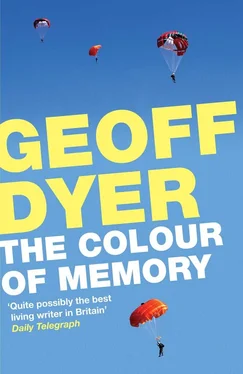‘Can’t I just watch you and imagine you’ve got no clothes on?’ I said.
There was a sharp intake of breath as Foomie prepared to shout.
‘I’m joking, I’m joking!’ I said. ‘Look, I’m dancing, see? My heads nodding, my foot’s tapping.’
I went out to the kitchen to fetch the bottle of tequila. When I came back Foomie was standing at the window, looking out.
‘Hmmn, chilly,’ she said, putting on her cardigan.
The block opposite was invisible except for the angular pattern of windows which appeared as squares of coloured light — warm yellow, mauve blue — hanging in emptiness, capillaried by the scribbled silhouettes of twigs. The room was filled with the cool breath of the rain. The sound of dripping trees, the faint moan of traffic. I poured Foomie another drink.
‘We could go to the cinema. What’s on at the Ritzy?’ I said.
‘Oh, it’s that stupid Japanese film about a man getting his willy cut off. What’s it called? “I’m not a Corridor” or something like that.’
‘I’ll tell you what we could do,’ I said, laughing and reaching for the bag of grass. ‘There’s a dog fight tonight in Stockwell. We could go to that.’
Foomie shook her head.
‘What about badger-baiting over in Essex?’
‘Badger-baiting is the pits,’ said Foomie. ‘What time is it? How much longer before I can go home?’
‘It’s early yet and we’re having a great time. .’
‘Like a house smouldering.’
We ended up going to the Atlantic. Foomie walked straight in; I got delayed at the door.
‘You want sinsee?’
‘No I’m fine.’
‘Black ash?’
‘No man I’m skint.’
‘How much money you got?’
‘I’ve just got enough for a couple of drinks. .’
‘You want a five pound draw?’
‘I told you, I’m skint. .’
The guy got fed up with me and waved me into the pub. Foomie bought two glasses of beer and we waited for the band to come on.
It was the first time I’d been in the Atlantic for a while. Since the night of the raids on Railton Road the pub had got into that cycle of dealing, arguments, fights and police. Despite this, it had been getting more and more crowded and Foomie and I devoted a lot of our energy to making sure we didn’t nudge somebody or spill their drink. Previously it had always been nice to get stoned and listen to music here; now I found myself overcome by waves of gulping paranoia.
Ray, an American who had been living in Brixton for a year, came over to where we were standing. I introduced him to Foomie and he told us how a gang was out to get him. He’d got into a fight after someone had spat in his hair while he was on a bus. When the bus stopped he dragged the guy on to the pavement and cracked him in the mouth a couple of times. By this time the guy’s friends had got off the bus too and Ray had had to run for it. Now the whole gang were out to get him.
The purpose of this story was to impress Foomie; he looked at her almost continually while he spoke. He even looked at her when he asked me what I would have done in his shoes.
‘On the bus?’
‘Yeah.’
‘Nothing.’
‘Nothing? I can’t believe it.’
‘I’d rather get spat on than beaten-up.’
‘Man, you can’t live like that. You’ve got to have some self-respect.’
‘That kind of thing is a question of self-preservation, not self-respect.’
‘So you’ll let people do anything to you? I can’t believe it.’
‘Look,’ I said, wondering what Foomie was making of all this. ‘I don’t like the idea of being spat on but apart from the unpleasantness — having to wash it off or whatever — it doesn’t really bother me. Obviously I think the guy who does it is a right fucking bastard but I’m not going to do anything about it. It’s like a code, that idea of self-respect. Either you buy into it or you don’t. That’s the one good thing about fighting; it usually takes place between people who share the same values. But I don’t share those values. That’s not where my self-respect lies.’
‘Where does it lie then?’
‘That’s a good question. Maybe I haven’t got any at all — which makes life a lot easier. .’
I thought of the guy who’d been beaten up on the tube. Nobody had done anything to help him; we were all paralysed by our fear. But there was a logic to our fear as well, a logic that we all shared: better he gets a pasting than I get stabbed trying to help.
Ray, meanwhile, was talking to Foomie who responded to his questions with the same formal politeness that I’d noticed when I first met her. As Ray spoke she slipped her arm through mine. Suddenly, off to the right, three young guys with knives were slashing at a big guy who batted them away with a bar stool. As they caught the bright lights of the stage their knives left gleaming hoops and arcs hanging in the darkness. The four of them gradually carved a path across the floor of the pub and disappeared around the corner of the bar.
‘Let’s go,’ said Foomie.
As we walked up Cold Harbour Lane I asked her what she thought of Ray. Laughing, she formed a circle with her thumb and index finger and shook her left hand slowly.
In the newspaper I read about the death of a violinist in a famous quartet. Like the other members of the quartet he was highly respected as an individual musician but it was the quartet itself rather than the individual members of it that was well known. Anyone who enjoyed chamber music would have heard of them but only a small percentage of these would have been able to name any of the members. Together they recorded complete cycles of Beethoven and Schubert quartets. When the violinist died — he was in his sixties — the quartet decided to disband rather than try to continue with a replacement. They had been playing together for about thirty years.
I got up to put a record on the turntable and listened to Coltrane swinging out in wider and wider arcs, aching on the frontier of the possible.
There was a photo of the four members of the string quartet practising together. They were all in their fifties or sixties, dressed in casual clothes with their jackets hung over the back of their chairs. Two were wearing glasses; one was bald and the other had white or grey hair. They had the look of gentle, considerate men who probably enjoyed a joke together during rehearsals when one of them played a wrong note or lost his way in the score. Probably they all had wives who may or may not have accompanied them when they made tours of England or the United States. What the photograph made most plain, however, was that for four or five or however many hours a day they practised they all shared in an activity that probably constituted their main reason for being alive. Gradually, I imagined, the intricacies of their relationships with each other became expressed and defined entirely by the music they were playing. It was hard to imagine them arguing.
It was equally hard to imagine how great must have been the sense of loss for the three surviving members of the quartet. Perhaps there was some trio for strings by Beethoven or Schubert which they would continue to play from time to time, a piece which, whatever its mood — even in the lightest, fastest movements — would be saturated, in their interpretation, by their longing for their dead friend.
There was something beautiful and poignant about the photograph of the middle-aged quartet: the raised bows, the sharp creases in the trousers, the music stands and the look of relaxed concentration.
The tape was coming to an end, the saxophone choked by its own intensity and drowned by the weight of the drums. I thought of Coltrane who was forty when he died, of Eric Dolphy and Charlie Parker and Lee Morgan — shot in a nightclub where he was playing; I thought of Fats Navarro and Clifford Brown who died in their mid-twenties, and of Booker Little who died when he was twenty-three.
Читать дальше












